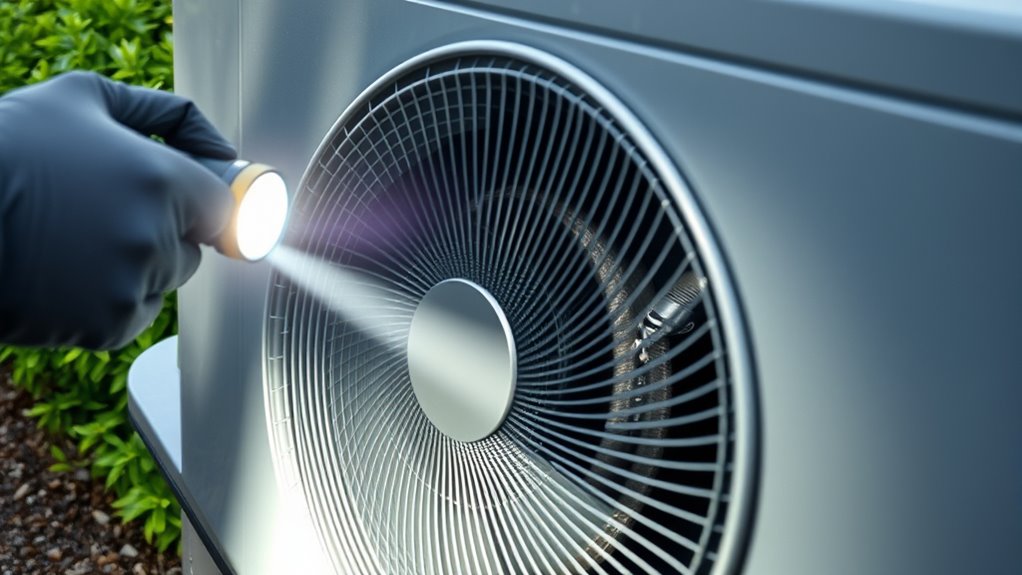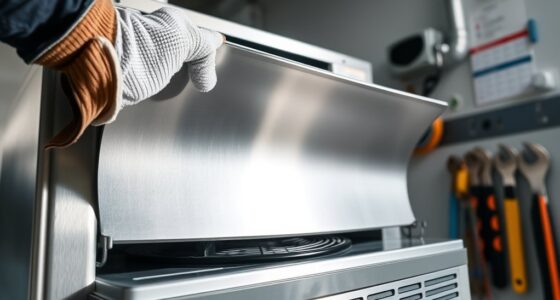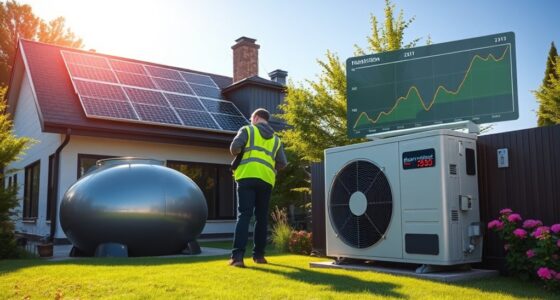To extend your heat pump’s lifespan, prioritize regular maintenance like checking refrigerant levels, cleaning filters, and inspecting outdoor coils. Proper airflow and professional check-ups help catch small issues early, preventing costly repairs and system failures. Neglecting maintenance can lead to higher energy bills, reduced efficiency, and quicker wear. Staying consistent with these steps guarantees your system runs smoothly longer, saving you money. Keep going to discover more effective ways to maintain your heat pump.
Key Takeaways
- Schedule regular professional inspections to identify and address issues early.
- Keep filters, vents, and outdoor coils clean to ensure optimal airflow and efficiency.
- Monitor refrigerant levels and ensure proper charging to prevent system strain.
- Perform routine maintenance tasks like cleaning and inspecting electrical connections.
- Address minor problems promptly to avoid costly repairs and extend system lifespan.

Are you aware that regular heat pump maintenance can considerably extend its lifespan and improve efficiency? Keeping your system in top shape isn’t just about fixing problems when they arise; it’s about proactive care that prevents issues before they start. A key part of this maintenance is monitoring refrigerant levels. If the refrigerant is low, your heat pump has to work harder to reach the desired temperature, which strains components and can cause premature failure. During routine check-ups, a technician will assess refrigerant levels and top them off if necessary, ensuring your system runs smoothly and efficiently. Proper refrigerant charge not only boosts performance but also helps you save on energy costs and reduces the risk of costly repairs down the line.
Another essential aspect of maintenance is airflow optimization. Over time, dirt, debris, and even plant growth can clog filters and obstruct vents, restricting airflow. When airflow is compromised, your heat pump struggles to distribute heat or cool air evenly throughout your home. This inefficiency leads to increased energy consumption and added wear on the system’s components. Regularly changing or cleaning filters is a simple yet effective way to maintain optimal airflow. Additionally, inspecting and cleaning the outdoor coils and vents ensures unobstructed airflow, preventing overheating and system strain. By maintaining proper airflow, you help your heat pump operate at peak performance, which extends its lifespan and keeps your energy bills in check.
Scheduling routine maintenance with a professional is essential for catching potential issues early. During these visits, technicians will examine your system thoroughly, checking refrigerant levels, cleaning coils, inspecting electrical connections, and ensuring airflow is unobstructed. These proactive measures help identify minor problems before they escalate into major repairs, saving you money and reducing downtime. Keep in mind that neglecting maintenance can lead to reduced efficiency, higher energy bills, and a shorter lifespan for your heat pump. Consistent care not only preserves the system’s longevity but also maximizes its performance, keeping your home comfortable year-round.
Frequently Asked Questions
How Often Should I Schedule Professional Heat Pump Inspections?
You should schedule professional heat pump inspections at least once a year, ideally before heavy use seasons. Following a consistent maintenance schedule helps catch issues early and guarantees your system runs efficiently. If you notice strange noises or decreased performance, schedule an inspection sooner. Regular inspections keep your heat pump in top shape, extend its lifespan, and improve energy efficiency. Make certain to stick to the recommended inspection frequency for peak performance.
Can I Upgrade My Current Thermostat for Better Efficiency?
Think of your thermostat as the conductor of your home’s comfort symphony. Upgrading to a smart thermostat enhances efficiency by adapting to your schedule and reducing energy waste. Just make certain it’s compatible with your current system to avoid technical dissonance. The benefits include remote control, energy savings, and detailed usage insights. This upgrade not only fine-tunes your heat pump’s performance but also turns your home into a smarter, more responsive space.
What Are Signs My Heat Pump Needs Urgent Repairs?
If your heat pump makes unusual noises or if you notice refrigerant leaks, you need urgent repairs. Noises like banging, squealing, or hissing often signal mechanical issues or refrigerant problems. Refrigerant leaks can cause your system to work harder, risking damage. Don’t ignore these signs—call a professional promptly to prevent further damage, extend your heat pump’s lifespan, and keep your home comfortable.
How Does Outdoor Weather Impact Heat Pump Longevity?
Like a ship weathering storms, your heat pump faces seasonal impacts and outdoor debris that influence its longevity. Harsh winter cold can strain components, while summer heat pushes the system harder. Debris like leaves and dirt clog filters and vents, reducing efficiency. Regularly clearing debris and preparing your unit for seasonal changes helps it withstand outdoor weather, ensuring it runs smoothly and lasts longer.
Are There Eco-Friendly Maintenance Options for Heat Pumps?
Yes, you can choose eco-friendly maintenance options for your heat pump. Use recyclable refrigerants to reduce environmental impact and biodegradable cleaning agents to keep your system clean without harming the planet. Regularly scheduling maintenance with eco-conscious products helps prolong your heat pump’s life while supporting sustainability. You’ll enjoy efficient performance and lower your carbon footprint, all while caring for your home and the environment simultaneously.
Conclusion
Regular maintenance is like giving your heat pump a health check-up—keeping it running smoothly for years to come. I once knew someone who ignored their system’s strange noises; eventually, a small problem became a costly repair. Just like tending a garden, consistent care prevents unexpected weeds and overgrowth. By staying proactive, you’ll extend your heat pump’s lifespan, saving money and avoiding sudden breakdowns. Think of maintenance as your secret weapon for long-lasting, reliable comfort all year round.









